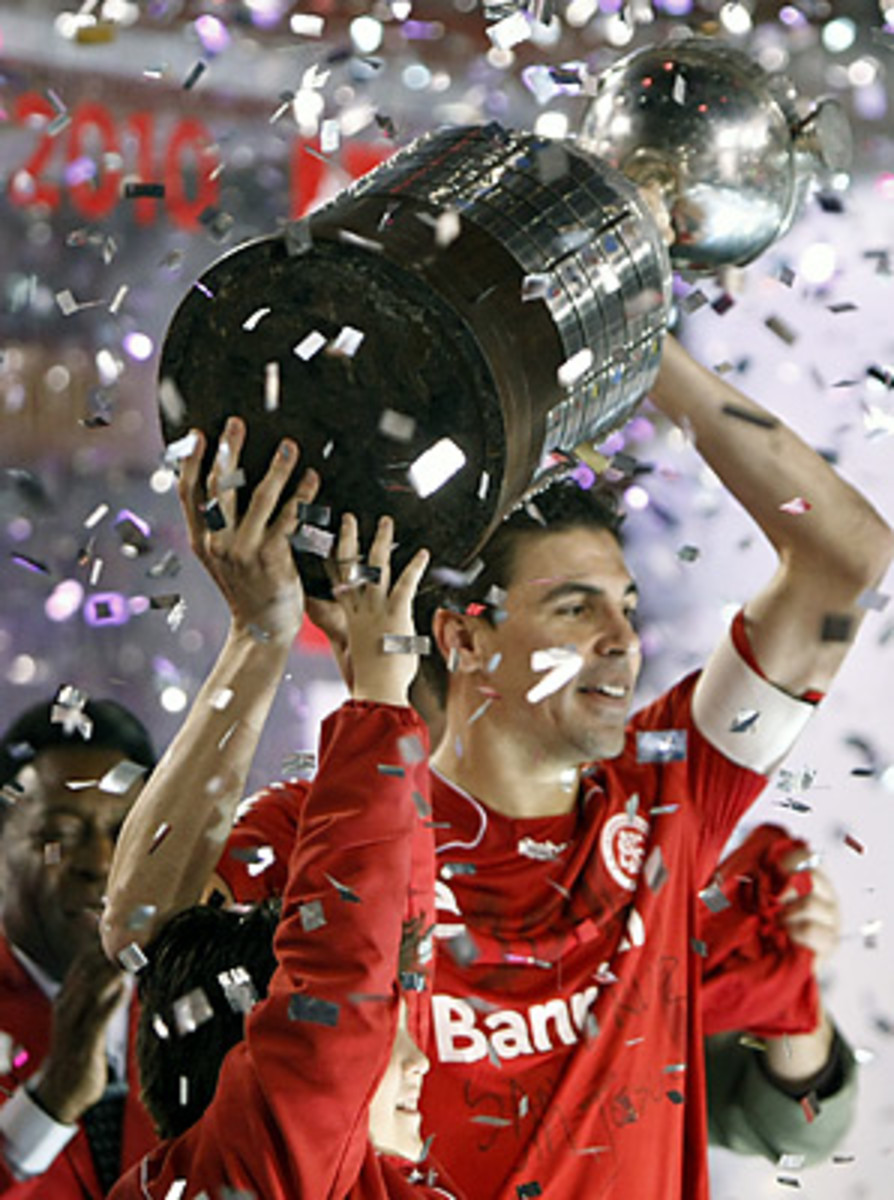Internacional's trophy remains nothing short of remarkable
But, shortly before halftime, Chivas took the lead and leveled the aggregate score, with the talented Marco Fabian hooking home an excellent shot on the turn.
Brazilian nerves were jangling, and no wonder. Was the curse of the Libertadores about to strike once more?
In recent years, Brazilian clubs have exerted a stranglehold on South America's equivalent of the Champions League -- only to fall at the final hurdle. The stats are striking.
The year 2000 is an appropriate starting point, because that is when the competition was expanded, with, after a brief qualifying round, 32 teams contesting the group stage. Since then, only two clubs from Argentina have reached the final of the Libertadores -- Estudiantes last year, and Boca Juniors on a number of occasions. But they have won the title five times -- one to Estudiantes, four to Boca.
Meanwhile, nine different Brazilian clubs have got through to the final -- Palmeiras, Sao Caetano, Santos, Sao Paulo, Atletico Paranaense, Internacional, Gremio, Fluminense and Cruzeiro. But there have only been three victories -- two for Inter, one for Sao Paulo. Two of those wins came in all-Brazilian finals. On six occasions since 2000, the Brazilian club lost the final to foreign opposition.
So when Fabian scored that goal there were fears of yet another shocking defeat. Would Internacional's dominance of the first leg count for nothing? Would nerves undermine them when it mattered most? During the halftime break in Porto Alegre many were recalling that the last time a Brazilian team overcame foreign opposition in the Libertadores final was way back in 1999, when Palmeiras beat Colombia's Deportivo Cali -- and even that win came on penalties.
That now becomes a dead statistic, because Inter came roaring back with a rousing second half performance to win 3-2, and 5-3 on aggregate.
With this win following on from their 2006 triumph, Internacional account for the last two times the trophy has gone to Brazil -- a remarkable achievement. Their home city of Porto Alegre, where they duel with Gremio for local affections, has a much smaller population than Sao Paulo or Rio de Janeiro, or even Belo Horizonte. But Inter compensate with sound administration, superb youth development and an excellent eye for a good player.
Over the last few years, they have worked a model where they aim to produce potential superstars, have the benefit of their services for a couple of years and then sell them to Europe, thus enabling the club to finance an impressive structure and a competitive squad. This, of course, has become the dream of most South American clubs. But Inter do it better, more systematically, and without deceiving their supporters with populist lies. No one is surprised when they sell their stars -- the club are honest enough to admit that this is an objective. Milan striker AlexandrePato is their brightest recent export. Now the Libertadores campaign is over, midfielder Sandro is off to England to join Tottenham.
As well as producing their own, they also buy in shrewdly. The proximity of Porto Alegre to Argentina and Uruguay enables them to take advantage of the fact Brazilian soccer is currently paying considerably more than the rest of the continent. The strength of the 2010 team is its midfield - where one Argentine, PabloGuinazu, is the heartbeat, and another, AndresD'Alessandro, supplies the quality.
And Inter are always alert to the possibilities of the Brazilian market. Last year, after he showed promise in the South American Under-20 Championships, they snapped up midfielder Giuliano from Parana. This versatile young man has received nothing like the hype of the Santos pair, Neymar and PauloHenriqueGanso, but he is every bit as interesting. He starred last year in the World Youth Cup, when he captained Brazil and comfortably outshined Ganso.
In this year's Libertadores, Giuliano has come of age at senior level, despite spending much of his time on the bench. Time and time again, he came on to make a dramatic contribution, and finished the campaign as Inter's top scorer. The last of his six goals was an absolute joy - a little dribble through the heart of the Chivas defense followed by a subtle chip over the advancing keeper. It showcased his talent and quick feet, even quicker thinking and wonderful balance - a goal worthy of clinching any title.
Giuliano will surely be on his way to Europe before too long -- it is the way Internacional operate. But he will surely still be around in December, when they will be training their sights on overcoming Internazionale of Milan to lift the World Club Cup.
Providing both teams get through their semifinal, the clash of the Inters promises to be a more even game than the recent finals in this competition -- when even if the South American team has won it took the field recognizing its inferiority and concentrated on defense. The 2010 model Internacional, the newly crowned kings of South America, should be capable of something more ambitious.





